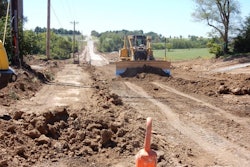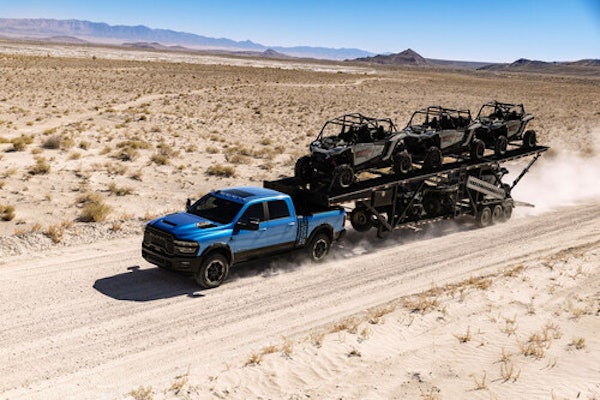Roller compacted concrete has been around for nearly half a century, but it still isn’t widely used across the construction industry. Skeptics have labeled it “squish concrete” and written it off entirely.
But Kevin Chumbley, vice president of Davenport, Iowa-based Anderson Commercial Concrete, is a believer.
Chumbley adopted the technique four years ago and hasn’t looked back. “It was something that nobody was doing in our area. We saw a market that we could try it.”
While the finished product is just as durable and strong as conventional concrete pavement, the mixing process and paving technique are very different.
RCC starts with the same basic ingredients as conventional concrete – aggregates, Portland cement, supplementary cementing materials, such as fly ash and slag cement, chemical admixtures and water. Where it differs is the stiffer, no-slump mix consistency – and because of that, it can be more difficult to work with.
RCC does not require forms, hand finishing or rebar reinforcement. The pavement is placed with an asphalt paver and then compacted with vibratory rollers.
“We’re still perfecting it,” Kevin says. “We have some good days, and we have some bad days with it. It’s so finicky. An ounce too much water and we can get a dip in the pavement. Then, not enough water and it’s hard to work with. Every project, every day, we're learning something new with it.”
Check out the video above to hear Kevin explain the RCC paving process. Anderson Commercial Concrete was one of 12 finalists in Equipment World’s 2025 Contractor of the Year awards.
When Anderson purchased a Voegle asphalt paver to lay the concrete, its dealer sales representative was skeptical about the decision.
“The asphalt guys don’t like concrete, and concrete guys don’t like asphalt, so there’s a gray area that there are only a few people who want to try this RCC, so he was kind of surprised that we were interested in it,” Chumbley recalls.
But Chumbley saw RCC as an opportunity to save money and be more competitive and went for it. In the last four years, Anderson has laid almost 2 million square feet of RCC and continues to invest in technology to improve RCC placement, including automating its paver with a UTS total station.
“It’s less about individuals messing with buttons or checking levels,” says Chumbley. “Now, it’s the whole crew working together, plotting and checking in real time as we go.”
They have also started using admixtures and surface sprays, allowing the RCC to be power troweled for a broom-like finish, similar to conventional concrete. RCC can also be surface textured through grinding or grooving to remove the appearance of exposed aggregate.
The most significant benefits Anderson has experienced are faster construction with less forming, which results in fewer employees on the job. The RCC has also shown impressive compressive strengths up to 10,000 psi.
“We don't have any forming. So, once we get graded the next day, we can start pouring. And then, within two or three days, we can get car traffic back on there. We pushed it a little bit, maybe five days for getting semi traffic on there.”
According to the RCC Pavement Council, low cost continues to draw engineers, owners and construction managers to RCC. It can be placed quickly, has the strength to withstand heavy and specialized loads, is durable in freeze-thaw environments and has the versatility to take on a wide variety of paving applications.
About the Contractor of the Year Award
The Equipment World Contractor of the Year program has been sponsored by Caterpillar since its inception in 2000. It recognizes contractors who display the highest standards of business acumen, equipment management expertise, attention to safety and community involvement. Each year, 12 finalists receive an expense-paid trip – this year to Nashville – to participate in roundtable discussions and an awards ceremony.
Throughout the year, Equipment World will post profile stories and videos of each of the finalists on equipmentworld.com. To see who made the finals, click here.
The nomination period for the 2026 program will open this summer.
Equipment World serves up weekly videos on the latest in construction equipment, work trucks and pickup trucks – everything contractors need to get their work done. Subscribe and visit us at equipmentworld.com!











